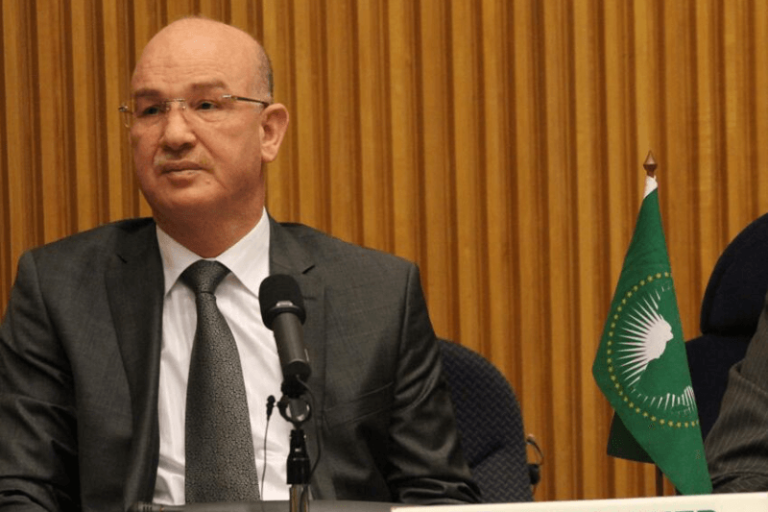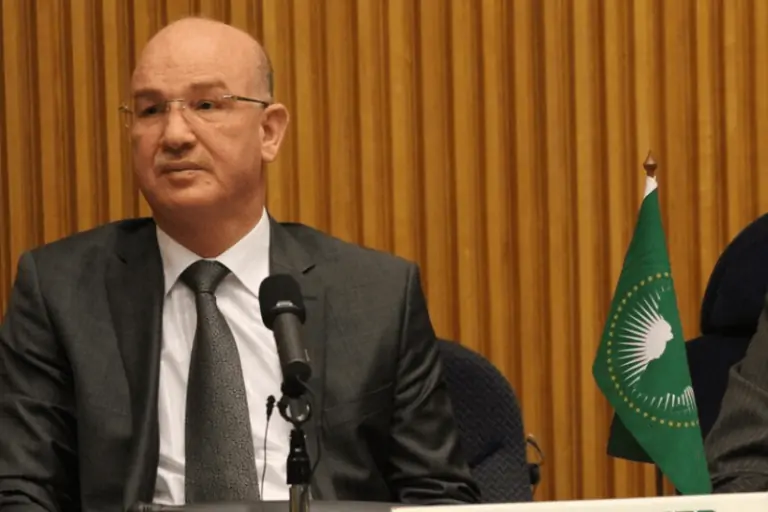

challenges of peace and security for africa an interview with ambassador smaïl chergui
Given the ongoing peace and security issues facing Africa, PSC Report asked former African Union Peace and Security Commissioner Ambassador Smaïl Chergui opinions on the matter.
Although the continent has made significant progress in peacebuilding and conflict resolution, ongoing and new issues still compromise development. The security scene of Africa is more difficult than it has ever been, and none of its five regions are totally peaceful or their people totally safe. The many unconstitutional changes of government (UCGs) expose the backsliding of democracy and governance that horrifies me. Neither could we stop these nor provide tools and conditions to help impacted nations go back to constitutional order, much more importantly, handle the causes.
Furthermore profoundly influencing Africa in a very polarized international environment almost without compass and morality are instability, the ever-growing terrorism threat and related criminal networks, and climate change. The return of interstate conflicts in Western Sahara and the Great Lakes region worries me greatly. Complicating matters is Sudan’s civil war, Libya’s complexity, terrorism in West Africa, and Sahel nations’ dissatisfaction over inadequate assistance to solve their problems.
Supported by AU/regional economic community (REC) policies and tools, national and regional responses in Somalia, Central African Republic (CAR), and Mozambique are encouraging but we need imagination and bold ideas to manage and fix crises. Apart from denialism and subsidiarity, the Peace and Security Council (PSC) should respond swiftly and forcefully on approaching crises. At a time the United Nations (UN) is searching for fresh paths to keep peace in Africa and elsewhere, this will boost our credibility and legitimacy. After the AU-UN Hybrid Operation in Darfur (UNAMID), United Nations Multidimensional Integrated Stabilisation Mission in Mali (MINUSMA), and shortly the UN Organisation Stabilisation Mission in the Democratic Republic of the Congo (MONUSCO) closes.
Terrorism has reached unprecedented levels. Our continent, regrettably, has become terrorism’s global epicenter, with attacks more than tripling in the last year alone. Terrorist groups are in all regions of Africa, consolidating their positions and expanding at an alarming rate. Dominant are local groups with affiliation to either Daesh (Islamic State) or al-Qaeda that are perpetrating a complex mix of ideology-driven acts of violence, transnational organized crime, and insurgency. In 2023, five of the 10 most-affected countries were in Africa, namely Burkina Faso, Mali, Somalia, Nigeria, and Niger. Africa is likely to become the headquarters of global groups such as al-Qaeda and Islamic State.
Terrorism has been imposed on Africa as neither al-Qaeda nor Islamic State was created or started its criminal activities on the continent. We have been fighting terrorism for 22 years, in many cases alone and without the necessary equipment. Yet we developed AU tools to coordinate and foster cooperation among member states, prevent radicalization, and fight the scourge. These efforts include the Somalia mission and those against the Lord’s Resistance Army (LRA) and Boko Haram. Africa has degraded different terrorist groups, upgraded and adapted the training of its forces, and mobilized the international community to shore up its financial resources.
We urgently need now to consolidate these efforts through a comprehensive approach not limited to military and security responses. We need a multifaceted strategy of intelligence cooperation, socio-economic initiatives, strengthened governance, community-driven approaches, and robust international collaborations. This should address immediate threats and conditions that foster terrorism.
Given the tremendous challenges and crises and its limited resources, the Council’s efforts have been outstanding. Through peace support missions, we liberated 80% of Somalia’s land and offered space to elected institutions. We degraded LRA and put an end to its horrific crimes against people. Within UNAMID, we helped quiet and stabilize Darfur. We put a force in Sudan, Mali, and CAR at a very critical period for all three.
In making the African Peace and Security Architecture functional, the inauguration of the continental logistics base in Douala and the military exercise in December 2015 in Lohatla, South Africa, are major achievements in enabling the standby force. Much attention has also been directed to prevention, particularly structural prevention, to establish conditions to evolve from early warning to early action. In addition, peace accords have been secured in Mali, South Sudan, and CAR as part of conflict mediation and settlement.
The PSC has very actively supported youth and women inclusivity, democracy, good governance, the rule of law, and justice, in conformity with the highest international standards. These efforts have developed a stronger image globally of the PSC and AU, leading the creation of alliances based on mutual respect, especially with the UN. The Council continues to be deeply involved in devising peaceful solutions to the crises in Libya, the Great Lakes region, and Sudan amid clear implications that foreign actors are at work.
Member states always tailor the fit they want. You have a sense of their individual will through their contributions to the budget and the AU Peace Fund, their participation at the meetings, their inputs, and initiatives.
Less than ten people oversee the PSC Secretariat; the UN Security Council (UNSC) secretary is assisted by 130 staff members. That shows the degree of pressure to plan, coordinate, and follow up on Council meetings held in Addis Abba.
Its decision-making process may also have to be strengthened to guarantee timely and relevant responses to developing crises in line with the treaty founding the PSC. Although it is crucial to make sure RECs are our first choice of action and response, it should not slow down quick decisions on new crises.
Established to represent continental interests rather than those of any one nation or region, the PSC was The time has also come to aggressively advocate alternative financing for peacemaking and post-conflict stabilization since AU Peace Fund resources are limited and the discussion on maybe using UN funds is far from finished. We need a permanent partnership with the African business community and private sector to secure investment in peace and security on a win-win basis. Under the direction of former AU Chairperson Mrs. Nkosazana Zuma, we must copy the shared common action we realized in fighting Ebola.
The African Standby Force should be strengthened through regular personnel training and exercises to ensure readiness and interoperability. These exercises should simulate scenarios including peacekeeping, humanitarian assistance, and counter-terrorism operations. The regional depots need to function as soon as possible.
The Continental Early Warning System has to be improved working with specialized organizations and REC systems. This will involve integrating advanced technologies such as satellite imagery, big data analytics, and artificial intelligence, improving data collection, analysis, and prediction capabilities, and training analysts and field officers.
Preventive diplomacy and mediation need to be reinforced by the timely deployment of special envoys and mediators with conflict resolution expertise, including FemWise mediators.
In the new world order, the AU and its nations should ensure that Africa is not again excluded. There should be better integration of gender and youth perspectives, including addressing the needs and challenges of women and youth in conflict and post-conflict settings, such as economic empowerment, education, and psychosocial support.
Communication and public awareness are also vital for garnering support and fostering a culture of peace. Investment should be increased in research and knowledge sharing, which can enhance the PSC’s ability to develop informed and effective strategies. Finally, continuous monitoring and evaluation are essential to assess the effectiveness of peace and security initiatives and make necessary adjustments.
The worldwide situation has been impacted for good by the battles in Ukraine and Gaza and a new world order is in the creation. The AU and member states should make sure that Africa is not again neglected or humiliated.
This will be easier if we silence the guns and valorize our real values and excellent practices to create a continent free of conflicts, stable, and devoted to providing socio-economic progress for its people. This is the time for leadership. It is our moment to prevail.
South African President Cyril Ramaphosa defended his nation against claims of white discrimination made by tech magnate Elon Musk. After…
Hilton launched Signia by Hilton for its first appearance in Egypt and Africa through its hotel expansions. These hotels at…
UNICEF reported that, nearly 2900 people died of cholera across Eastern and Southern African countries while children suffer most greatly…
Enza, based in the United Arab Emirates, obtained $6.75 million in initial investment funding from Algebra Ventures and Quona Capital.…
US Secretary of State Marco Rubio ordered South African Ambassador Ebrahim Rasool to leave America by March 21 because he…
Early 2025 ends with IPL fever in India and cricket fans receive good news of an international schedule full of…
This website uses cookies.